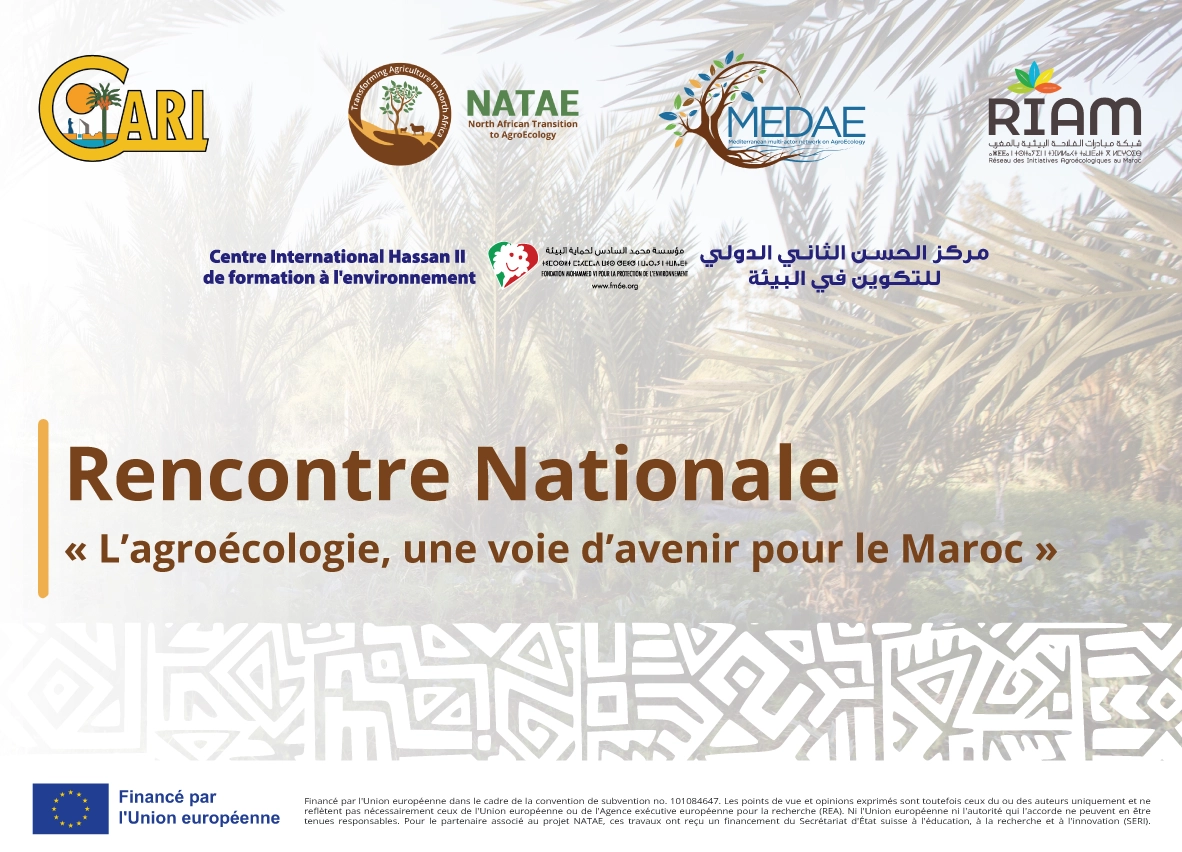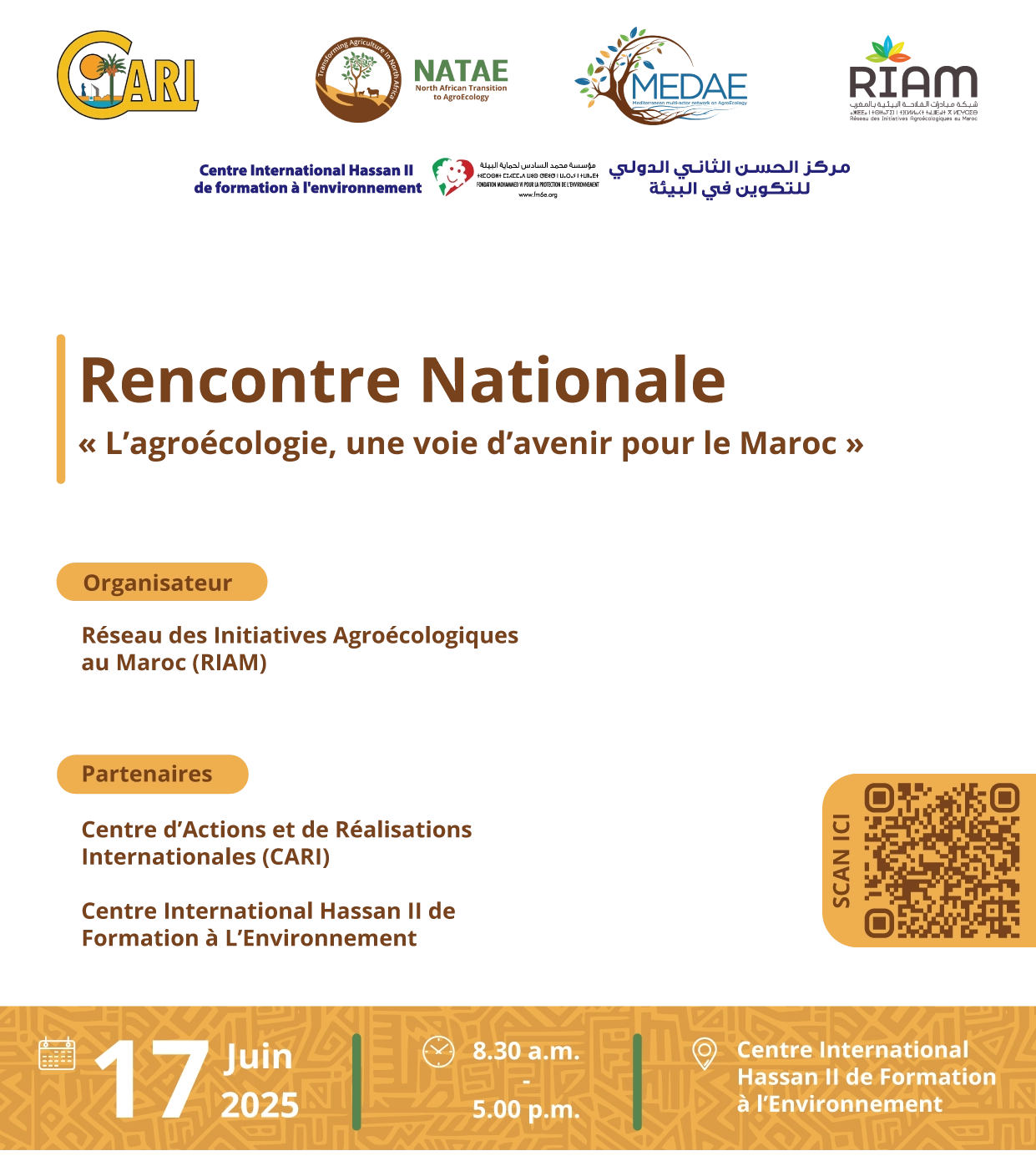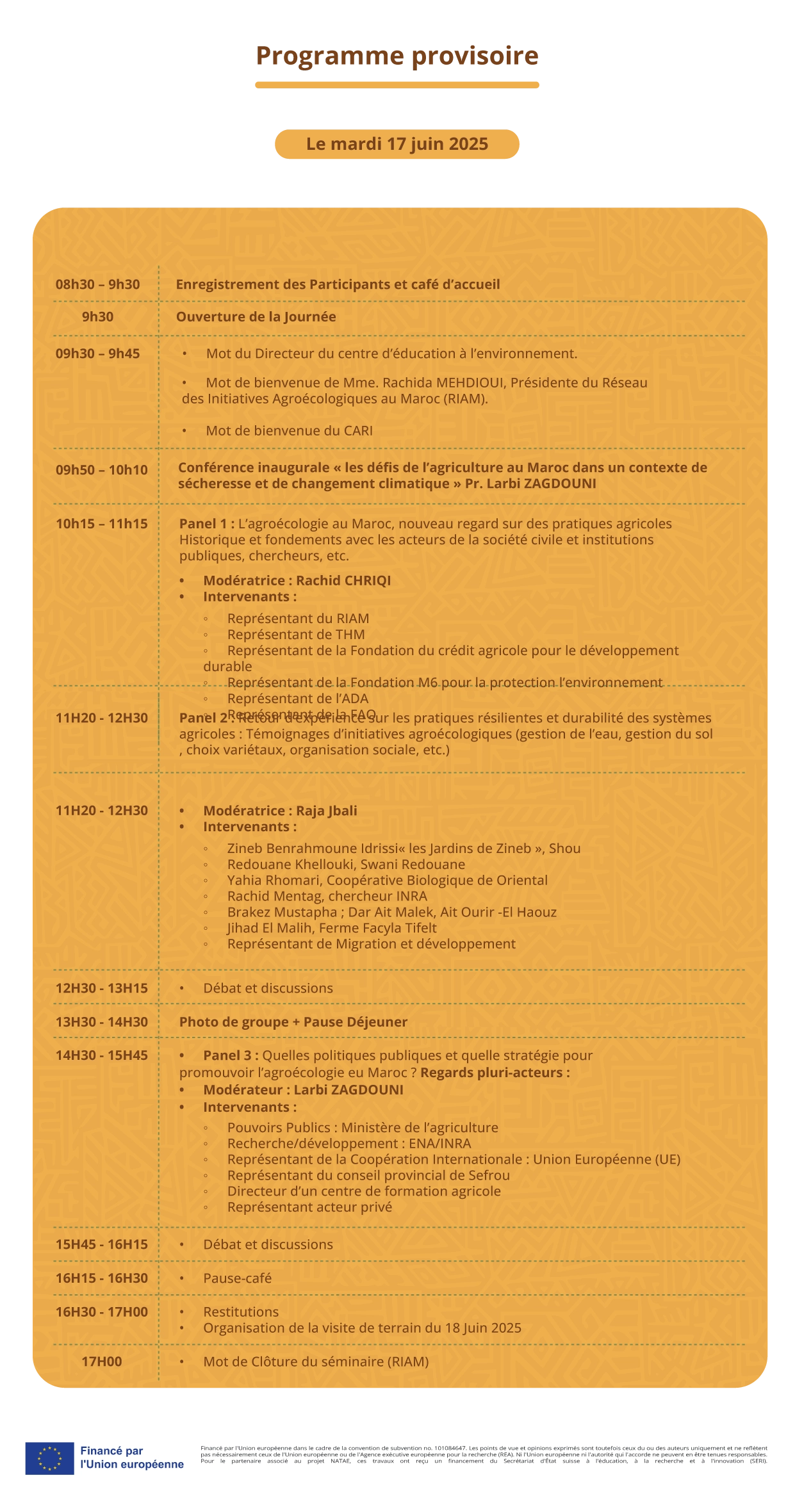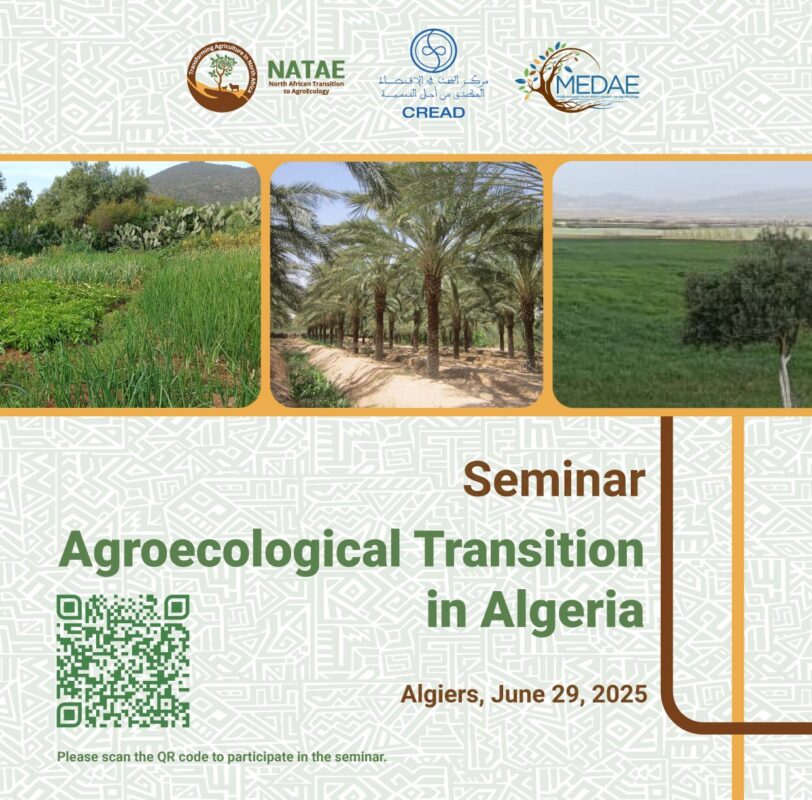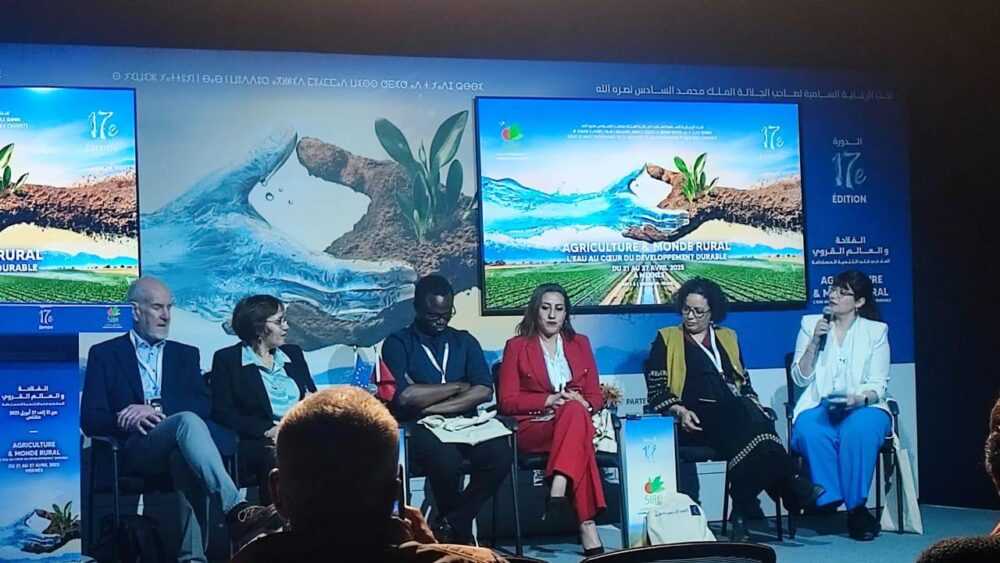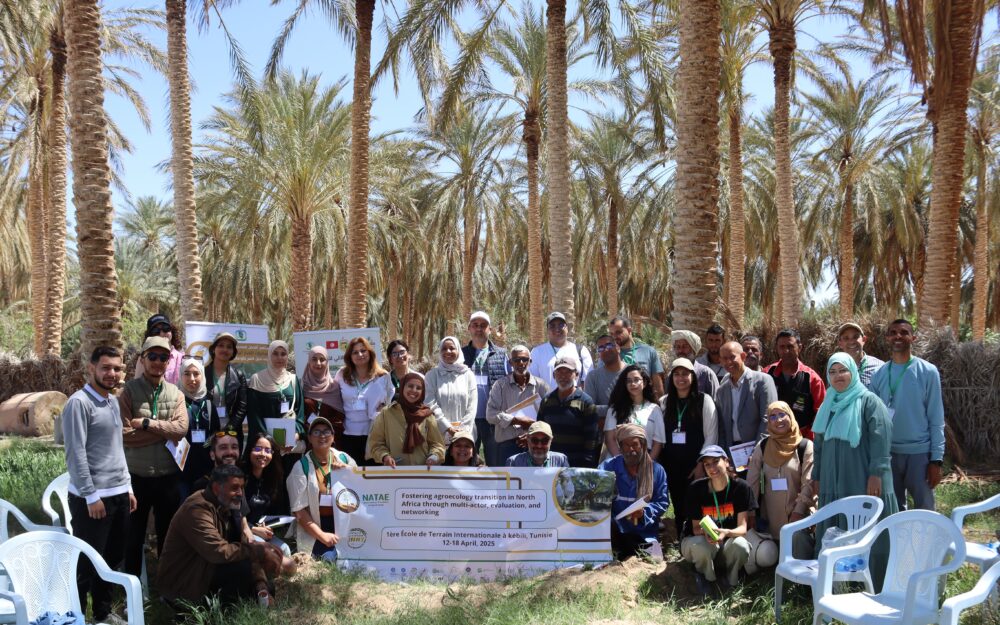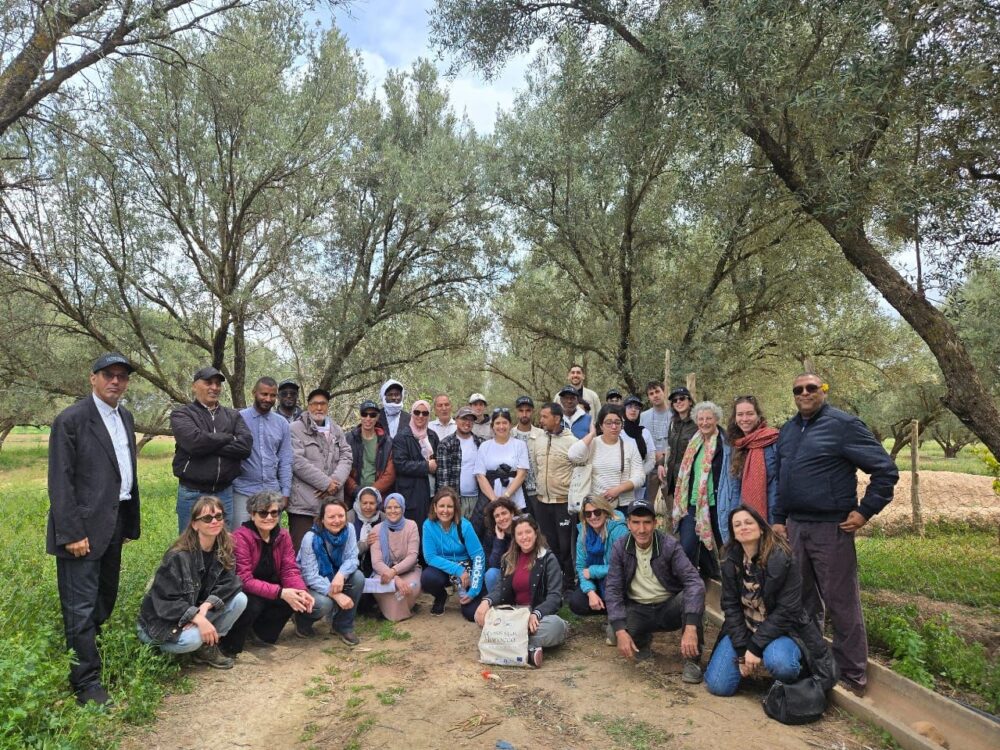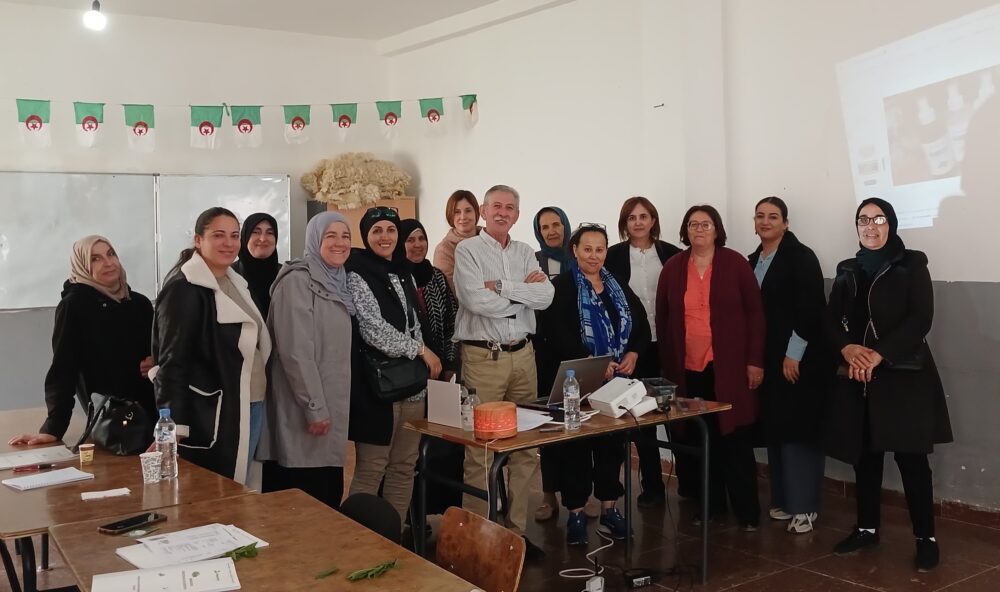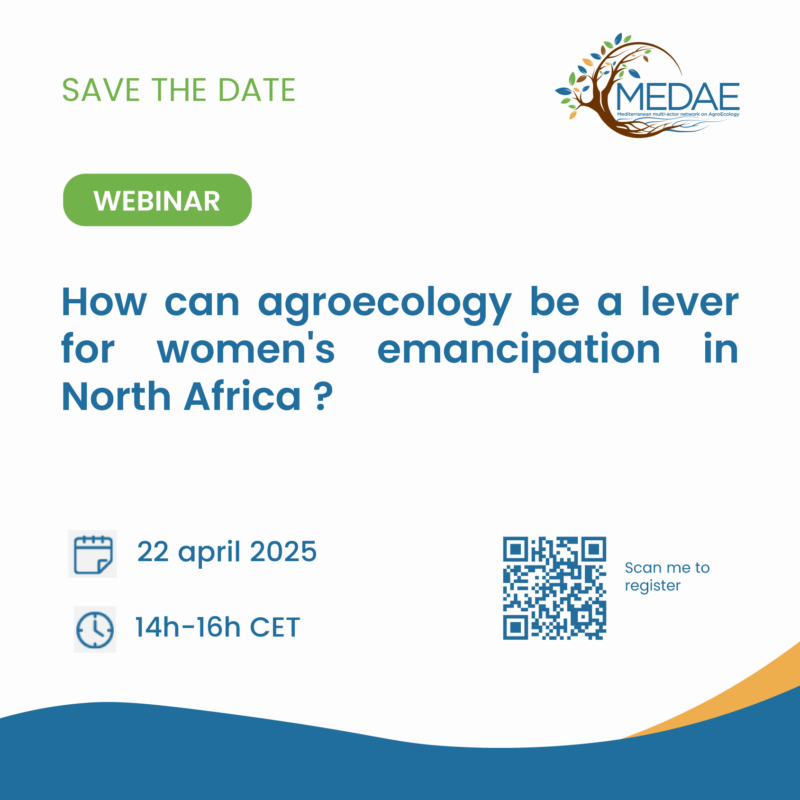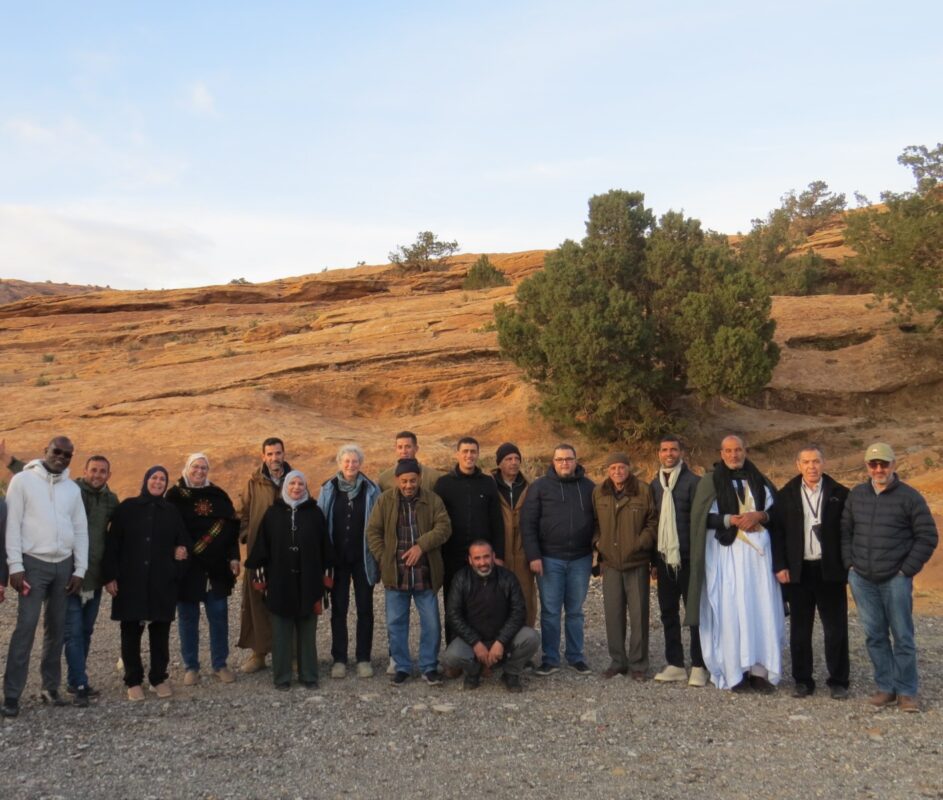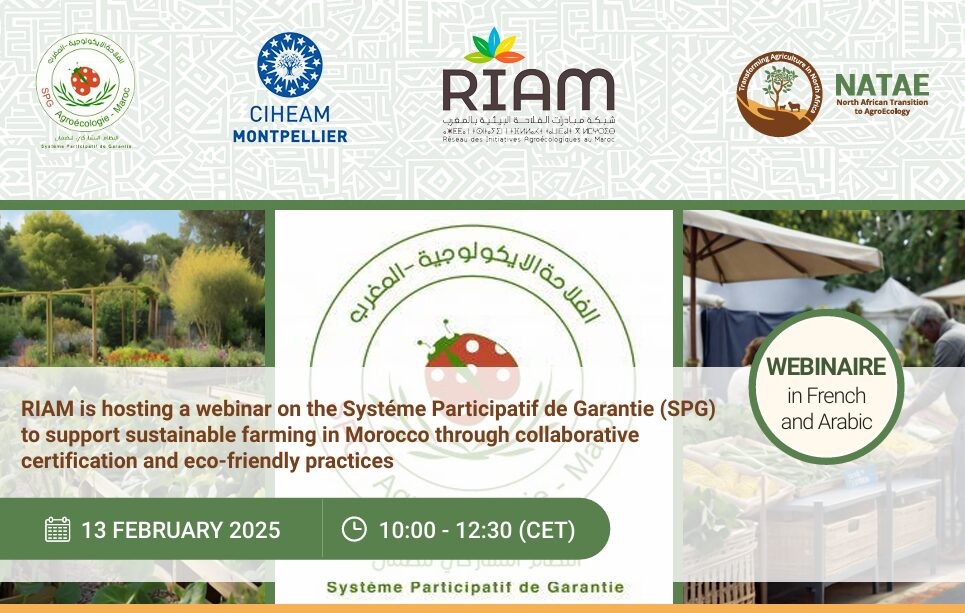Seminar – Agroecological Transition and Climate in Algeria
Seminar
Algiers, June 29, 2025
Agroecological transition in different ecosystems to combat climate change in Algeria: reflections on a multi-stakeholder approach
Summary
This seminar is organized within the framework of the NATAE project to address the agroecological transition in the face of climate change. The objective is to discuss climate impacts across ecosystems, promote the MEDAE network, and strengthen multi-stakeholder engagement. The event aims to support public policies in favor of agroecology and sustainable food systems, highlight local initiatives, and pool research findings. Another goal is to integrate Algerian initiatives for agroecological transition into a regional approach to share efforts and resources.
Program
- 10:00 – 10:30 – Participant Welcome – Registration
- 10:30 – 11:00 – Opening Ceremony
Moderator : Karima Boudedja - 11:00 – 11:30 – Coffee Break
- 11:30 – 13:30 – Session 1 : Agroecology in Different Agroecosystems of North Africa
Moderator: Amel Bouzid - 13:30 – 15:00 – Lunch Break
- 15:00 – 16:00 – Session 2 : Voices of Professionals in Agroecology
Moderator: Aissa Belhadi - 16:00 – 17:30 – Session 3 : Policies and Programs for the Agroecological Transition
Moderator: Amine Oulmane - 17:30 – Debate and conclusion
Click here to learn more and download the full agenda
RIAM at the 17th Edition of SIAM in Meknes
From April 21 to 27, RIAM took part in the 17th edition of the International Agricultural Show in Meknes (SIAM), one of the largest agricultural events in the region. On April 23, RIAM contributed to the conference “Practicing Sustainable Solutions to Conserve Agricultural Soil and Water,” organized by the European Union delegation.
During the session, RIAM presented its activities within the NATAE project, focusing on sustainable agricultural practices. The conference aimed to:
- Raise awareness and share knowledge on effective water and soil management
- Highlight innovative and integrated approaches, particularly agroecology as solutions to current environmental challenges
- Identify actionable strategies to strengthen the resilience of Morocco’s agricultural sector
RIAM shared insights into its training programs, cross-visits, and its ongoing work on Participatory Guarantee Systems (SPG) in agroecology, showcasing its contribution to a more sustainable and resilient agriculture in Morocco.
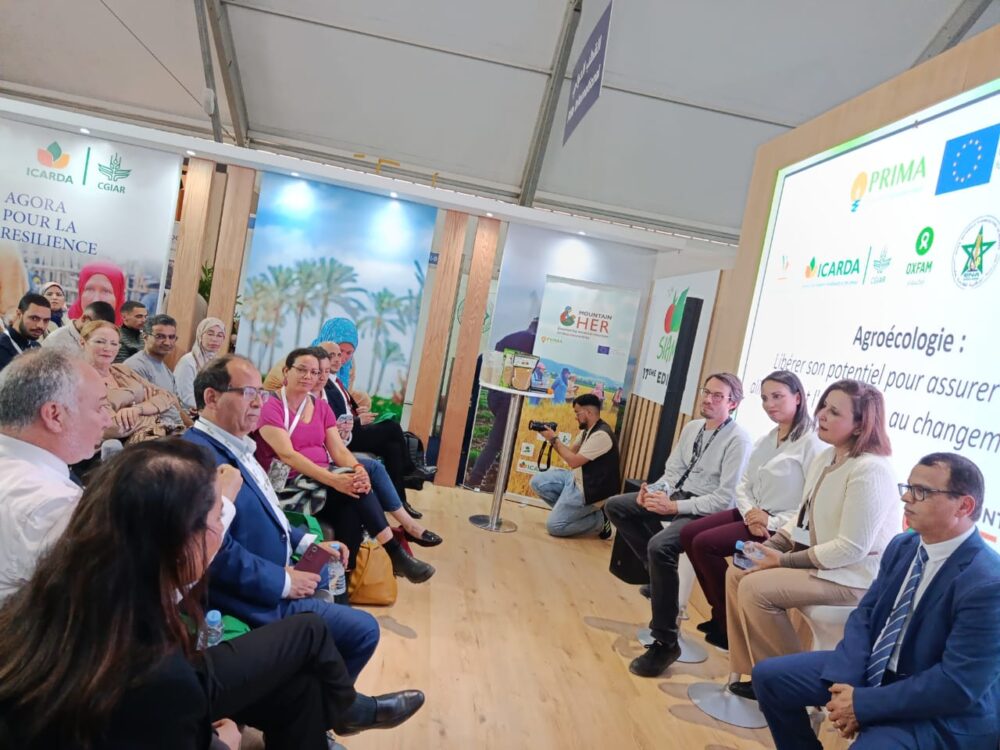
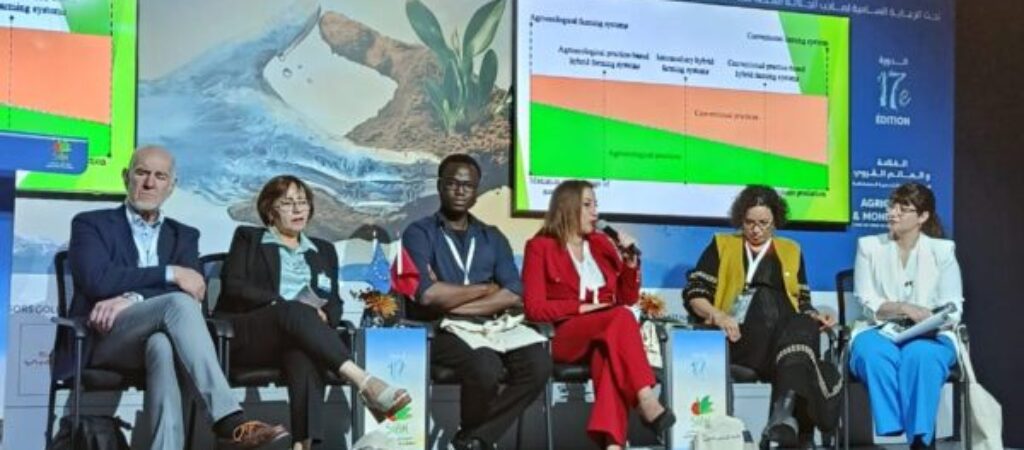
International Field School in the Oasis of Kébili | April 12–18, 2025
Organized by the INAT team in collaboration with local farmers and socio-economic actors, the International Field School brought together 18 students from Tunisia and NATAE partner countries to the oasis of Kébili.
This immersive experience offered participants the opportunity to develop practical field skills while contributing to the analysis of territorial dynamics in oasis ecosystems. Using participatory tools and field surveys, students worked across three thematic areas: biodiversity, water management, and oasis value chains, proposing actionable strategies for a successful agroecological transition.
Engagements with farmers took place in both traditional and modern oases, including enriching exchanges with the Women’s Association Val’oasis. Students explored local products and learned from the Jemna initiative, an inspiring model of collective oasis management within the social and solidarity economy.
The program concluded with student-led presentations and recommendations, shared with local stakeholders in a closing session that encouraged dialogue and collaboration.
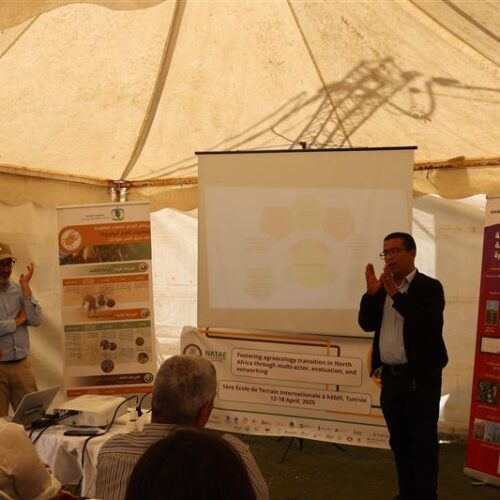
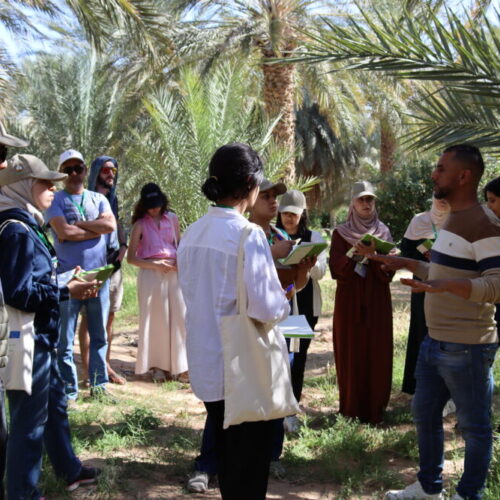
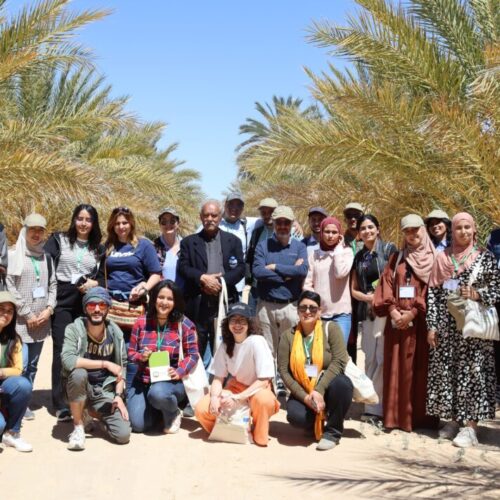
Continuation of cross-visits to Morocco with the Skoura M’Daz living laboratory (NSAM)
From 5 to 8 April 2025, NSAM (National School of Agriculture in Meknes) hosted the third cross-visit organised as part of the NATAE project. Researchers and students from NSAM joined around twenty farmers, researchers and development workers from Tunisia, Mauritania, France, Italy and the Netherlands to discover the activities of the Skoura M’Daz living laboratory. The group of participants included representatives from the Siliana (Tunisia) and PK 17 (Mauritania) laboratories, as well as researchers from WUR, IAMM and IAMB.
Participants travelled to the province of Boulmane, in the eastern part of the Moroccan Middle Atlas, to discover the Skoura M’Daz laboratory located in a mountainous agroecosystem. The four-day visit was structured around two major issues:
(i) the conservation and adaptation of local knowledge and know-how as well as biodiversity;
(ii) the socio-economic inclusion of young people and women through the medicinal and aromatic plant (MAP) sector.
In addition to the visits of several farms and cooperatives involved in the development and marketing of MAP, the participants also visited NSAM’s AgriTech platform, dedicated to the development and demonstration of low-tech agricultural tools, and were able to explore the Ait Otmane living laboratory, located in a peri-urban area and also set up as part of the NATAE project. At the end of each day, times for discussion and feedback were organized in order to enable participants to look back on what they had seen and learnt, and to highlight similarities and differences in relation to their own experiences and experiments in their laboratories.
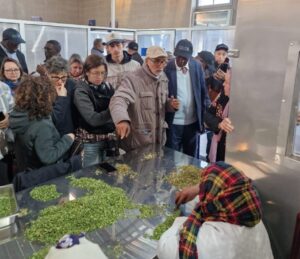
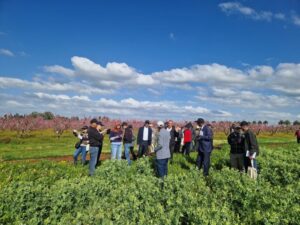
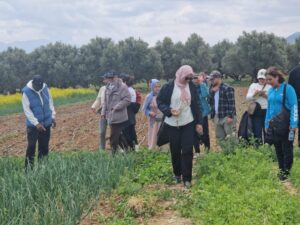
(i) Conservation and adaptation of local knowledge, know-how and biodiversity
The various visits and discussions highlighted the fact that local knowledge and know-how relating to the use and development of local biodiversity can improve crop resilience and help to maintain yields, particularly in the context of climate change. These practices include direct seeding, crop rotation and diversification, independent seed production and the use of rational irrigation techniques. The people we met all take a keen interest in the intergenerational transmission of knowledge and are adding to this heritage by gradually introducing new agroecological practices or new crops (saffron, lavender, fenugreek, etc.) into their production systems.
(ii) Socio-economic inclusion of young people and women through the MAP sector
The two women’s cooperatives visited, the Ennahah cooperative in Ifrane and the Safirat Alachaab cooperative in Skoura, made a deep impression on the participants in the cross-visit because of their capacity to produce, develop and market MAP. By enabling their members to structure themselves and increase their income, these cooperatives represent genuine models of social and economic empowerment for rural women. Their collective, flexible and supportive nature means that income is distributed fairly and family responsibilities are taken into account for each member. In these two cooperatives, MAP were initially gathered in the surrounding forests, but faced with growing demand for certain plants and the increasing scarcity of several endemic species, the women organised themselves to grow MAP, either on plots belonging to the cooperative, or on their own plots. A number of needs emerged from discussions with these women, particularly in terms of training in the domestication of MAP and their vegetative and generative propagation. The cross-country discussions between the participants during the cross-visit revealed that, despite very different contexts, women’s cooperatives appear to be real levers for innovation, sustainability and inclusion.
The next and final cross-visit planned as part of the NATAE project will take place in November in Mauritania, in PK 17 laboratory. Located on the outskirts of the capital, Nouakchott, participants will discover what combinations of agroecological practices can be implemented in peri-urban environments.
Tizi-Ouzou living Lab activities (Training session)
As part of the NATAE project on agroecological transition, CREAD organized a training session on April 27 and 28 dedicated to the extraction of essential oils and hydrosols from aromatic and medicinal plants. This session was aimed at women involved in the Tizi-Ouzou Living Lab, participating in the scenario focused on the development of agroforestry activities. The objective is to strengthen local capacities in the face of climate change and the scarcity of agricultural land
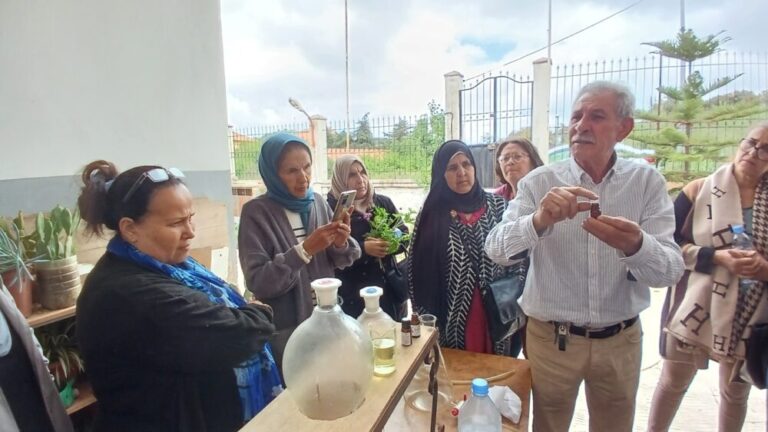
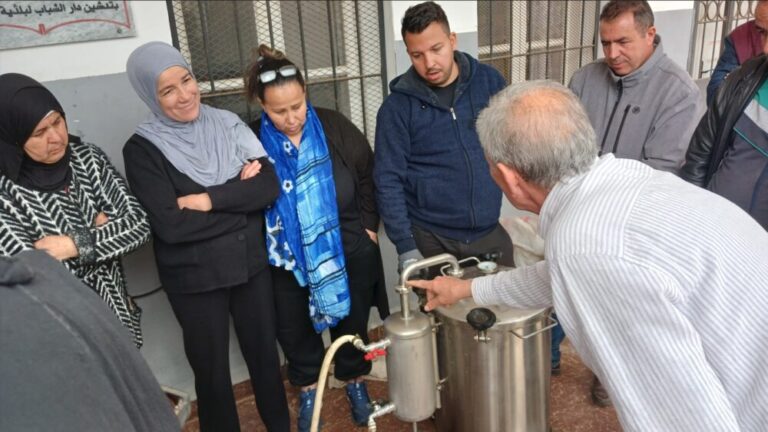
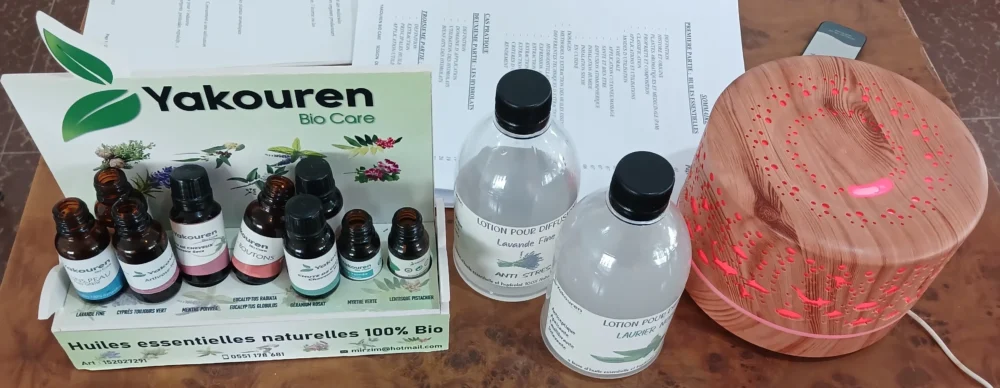
Webinar Medae: How can agroecology be a lever for women’s emancipation in North Africa ?
The MEDAE network is pleased to invite you to participate in the webinar ” How can agroecology be a lever for women’s emancipation in North Africa ? “ which will take place on Tuesday April 22, 2025 (14:00 -16:00 CET).
Summary :
This webinar will look at the place of women in food systems in North Africa, and how agroecology is helping to empower them. Presentations by researchers and farmers from Tunisia, Algeria and Morocco will provide a better understanding of how agroecology can empower rural women, enabling them to access new economic opportunities and participate in collective territorial dynamics. Several question and answer sessions will be held to enable participants to react to the presentations and share their own experience and vision of more inclusive rural development.
The webinar will be held in French, with English translation provided.
Program (CET) :
14h00-14h10 – Welcome, contextualization of the webinar, presentation of the webinar and speakers
Morgane Gaudin, MEDAE network Coordinator – CARI Association
14h10-14h20 – Introduction of the webinar : Role and place of women in agroecology in North Africa
Zoubir Chattou, Researcher at the Ecole Nationale d’Agriculture de Meknès (ENAM)
14h20-14h35 – TUNISIA : Neo-rural women settling in agroecology in oasis and peri-urban systems
Imene Chelbi, Farmer and founder of the El Rochen farm
14h35-14h55 – First question and answer session
14h55-15h10 – ALGERIA : Agroecology and emancipation of rural women in mountain agroecosystems
Karima Boudedja, Senior researcher at the Centre de Recherche en Economie Appliquée pour le Développement (CREAD)
15h10-15h25 – MOROCCO : Agroecology and emancipation of rural women in mountain agroecosystems
Ghizlane Echchgadda, Teacher-researcher at the Ecole Nationale d’Agriculture de Meknès (ENAM)
15h25-15h45 – Second question and answer session
15h45-15h55 – Closing remarks by the great witness
Rachel Bezner Kerr, Teacher at the Cornell University
16h00 – End of the webinar
The registration is mandatory, so sign up now here.
The second cross-visit, when the oasis becomes a laboratory : A knowledge-sharing meeting at the Laghouat Living Lab (Algeria)
From February 19 to 23, 2025, the Laghouat Living Lab hosted a cross-visit during which local and international experts shared their knowledge and experience in the face of contemporary climatic and economic challenges. For five days, participants explored together how to combine ancestral techniques and innovative approaches to build resilient and sustainable agricultural systems.
The second cross-visit of the NATAE project brought together around twenty experts from the Maghreb and Europe : farmers from the Laghouat and Tizi Ouzou LL (Algeria), actors from the Adrar Replication Laboratory (Mauritania) and Kébili RL (Tunisia), as well as researchers from CREAD, INAT (Tunisia) and WUR (Netherlands).
The El Argoub association organized a program structured around three major issues :
- water management in the face of drought
- processing and adding value to production
- co-construction of knowledge
Field visits formed the backbone of these exchanges. In traditional gardens, participants analyzed the ancestral “water tower” system via the seguias. Local farmers shared their techniques for collectively managing this scarce resource, prompting enriching comparisons with practices in Tunisia and Mauritania. A visit to the Tadjmout underground inferoflux dam, which captures floodwater while preventing evaporation losses, sparked lively discussions between hydrogeologists, researchers and farmers on hydraulic infrastructures adapted to arid zones.
During the farms visits, each participant was able to question, compare and document integrated crop-livestock systems specific to the oasis context. Mauritanian farmers shared their practices for adapting to even more arid conditions, while Tunisians presented their innovations in energy-saving irrigation. These exchanges in the field helped to collectively identify the resilience factors of agricultural systems in the face of climatic changes.
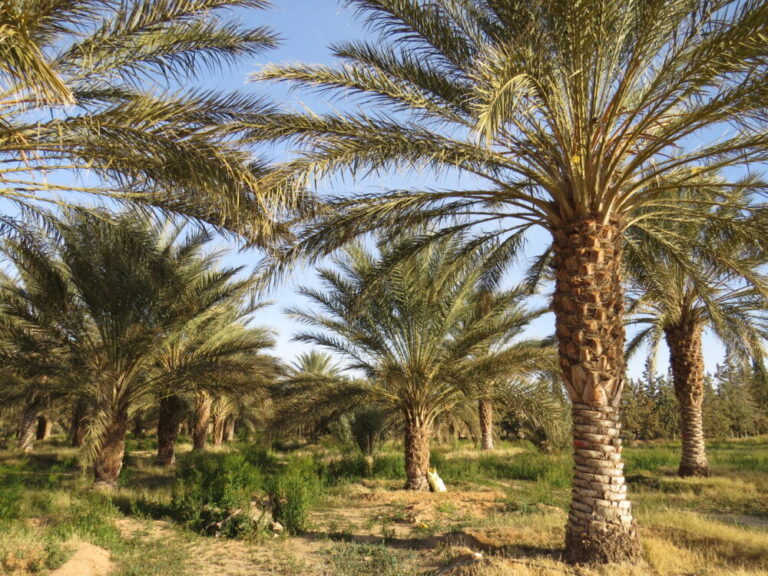

Workshops were held to methodically dissect field observations. The first workshop, dedicated to water management, compared traditional techniques with modern technological approaches. Participants mapped all the solutions observed, assessing their transferability from one territory to another.
A second workshop focused on value chains, dissecting the transformation processes observed in several production units. Farmers presented their techniques for valorizing date by-products, cheese-making and bee-keeping, triggering detailed technical exchanges on processes, equipment, costs and marketing strategies. Short circuits and e-commerce were the subject of comparative analyses between the different regions represented. The workshop on the co-construction of knowledge deeply impressed the participants. The El Argoub association presented its organizational model, sparking a collective reflection on cooperative structures as levers for agricultural innovation.
These exchanges and debates helped to formalize learning, identify transferable practices and contribute to new expertise and knowledge. These moments of collective intelligence recommended to maintain the exchange network in order to create a cross-border community of agricultural innovation adapted to the climatic challenges of arid zones.
For the final day, the participants discovered the Saharan Atlas and Djebel Amour, revealing the thousand-year-old history of this region where human ingenuity has always been able to adapt to environmental constraints. The Ksar of Taouiala, with its terraced gardens and irrigation system, as well as the rock carving stations, including the famous “elephant protecting her baby elephant” at El Ghicha, bear witness to the temporal depth of the relationship between man and his environment in this region.
This week of professional immersion demonstrated that oasis agriculture, far from being a relic of the past, is a model for the future, where traditional knowledge and technical innovation combine to shape resilient and sustainable agricultural systems.
Skoura Living Lab Activities Updates
The ENAM team recently welcomed two master’s students from Wageningen University as part of the NATAE project. One of the students, Luigi Lugaresi, worked on the technical aspects and experimentation of associating fenugreek, an aromatic and medicinal plant, with olive trees in Skoura. The other student, Fay De Beer, focused on studying and conducting surveys with male and female farmers, both within and outside of cooperatives in the Skoura Living Lab. For her work, she needed to organize a focus group with the women of the Safirat Al Aachab cooperative, so Safa Aatig who is part of the ENAM team organized this session and participated as an animator, facilitator, and translator during the focus group. The aim was to gather insights from the women about their vision for the future development of the cooperative and the techniques they believe are necessary to make this vision a reality.


Held on March 1, 2025 in Skoura M’daz, the Safirat Al Aachab cooperative members in the focus group discussion shared their vision for the future. In 2035, the three participating members aimed to cultivate 100% of their raw materials, growth from the current 70% purchased externally. It also includes the expansion of the cultivation of medicinal and aromatic plants such as saffron, lavender and oregano, which they started in 2024 and 2025.
The members of the cooperative emphasized their willingness to maintain the cooperative’s small and close-knit structure and do not want to admit new members. They visualize cultivating approximately 10 hectares by 2035 with both owned and rented land and concentrating on sustainable practices like drip irrigation. Besides, they showed an interest in obtaining ONSSA certification that would help in applying for government grants as well as to improve their products. However, they continue to reaffirm their commitment to reinvesting all profits back into the cooperative and not taking personal income.
RIAM is hosting a webinar on the Systéme Participatif de Garantie (SPG)

History, Objectives, Tools, How It Works, Farmers’ Testimonies, Consumers’ Testimonies.
Given Morocco and North Africa’s agricultural challenges due to climate change and food import dependency, agroecology presents a viable solution for sustainability and resilience.
Since 2018, RIAM has been developing the “Participatory Guarantee System” Label with support from institutional partners and civil society. Currently, about 60 farms in Rabat-Salé-Kénitra, Marrakech, and Casablanca are certified under this system, which promotes local quality assurance through active stakeholder participation, trust, networking, and knowledge exchange.
This webinar will guide farmers through the SPG Agroecology Morocco implementation process, fostering a participatory approach to drive an inclusive transition towards sustainable agricultural practices while ensuring economic viability.
PROGRAME
- Presentation of the history of the SPG
- Presentation of the objectives and tools
of the SPG - Testimonies from farmers and
consumers
